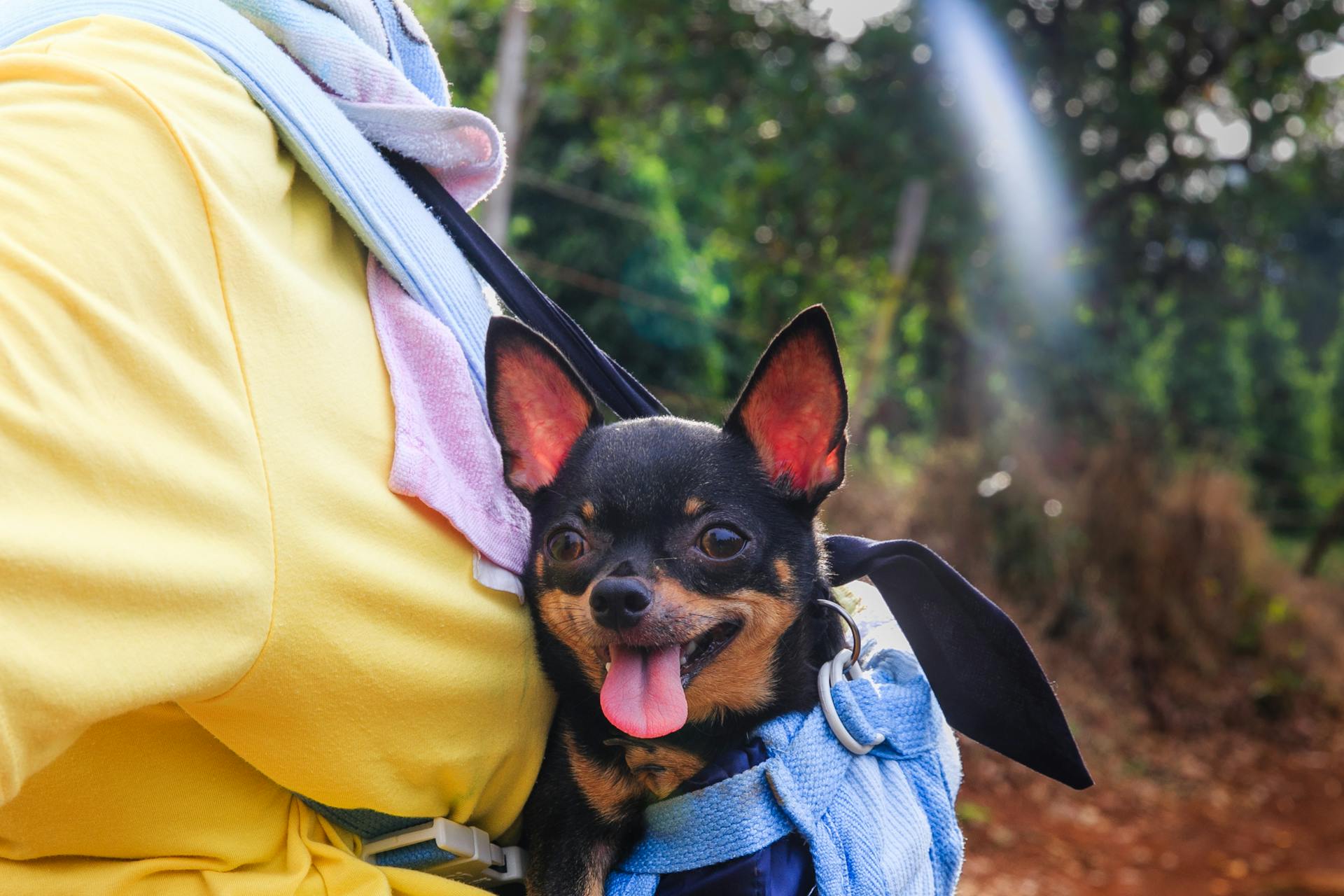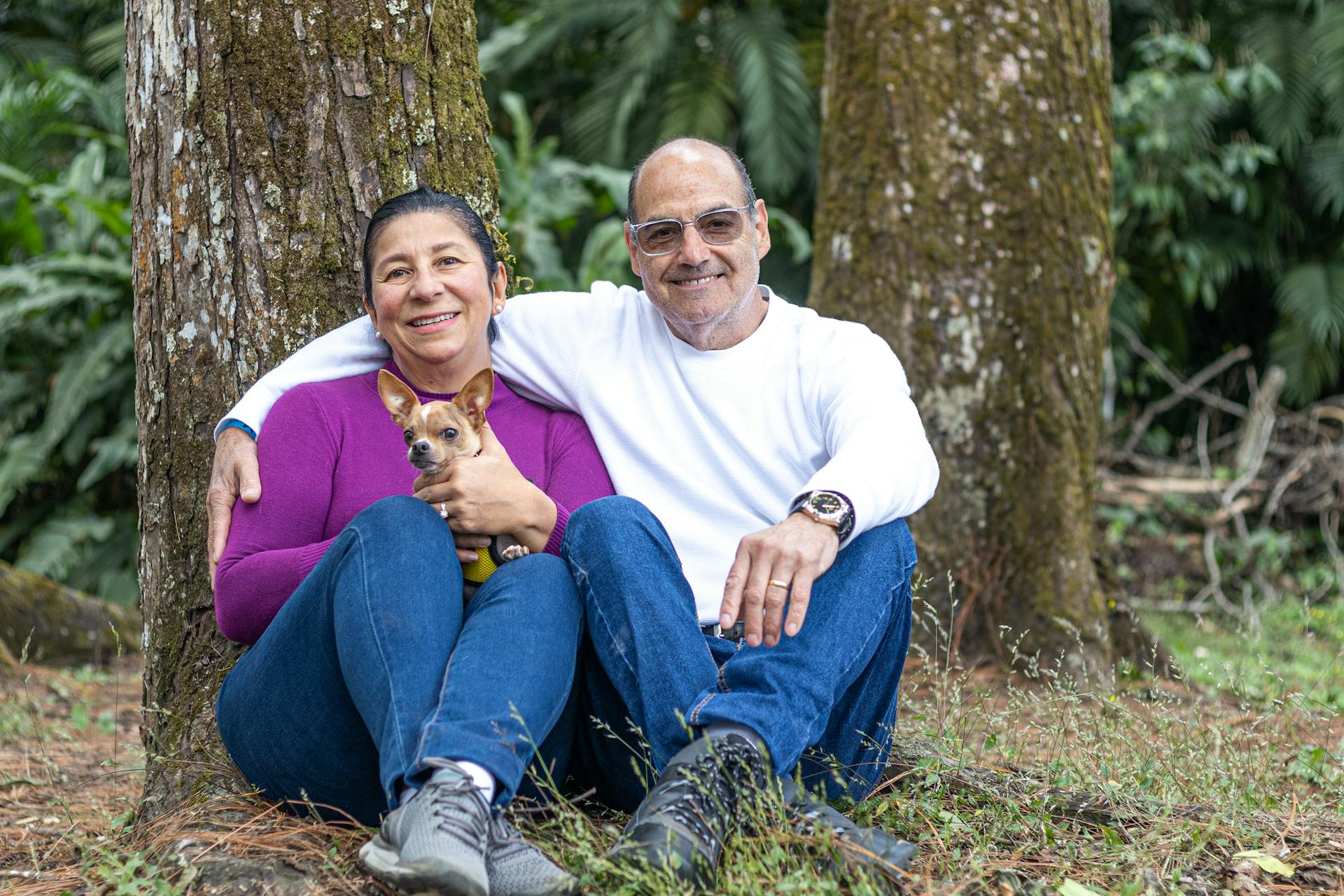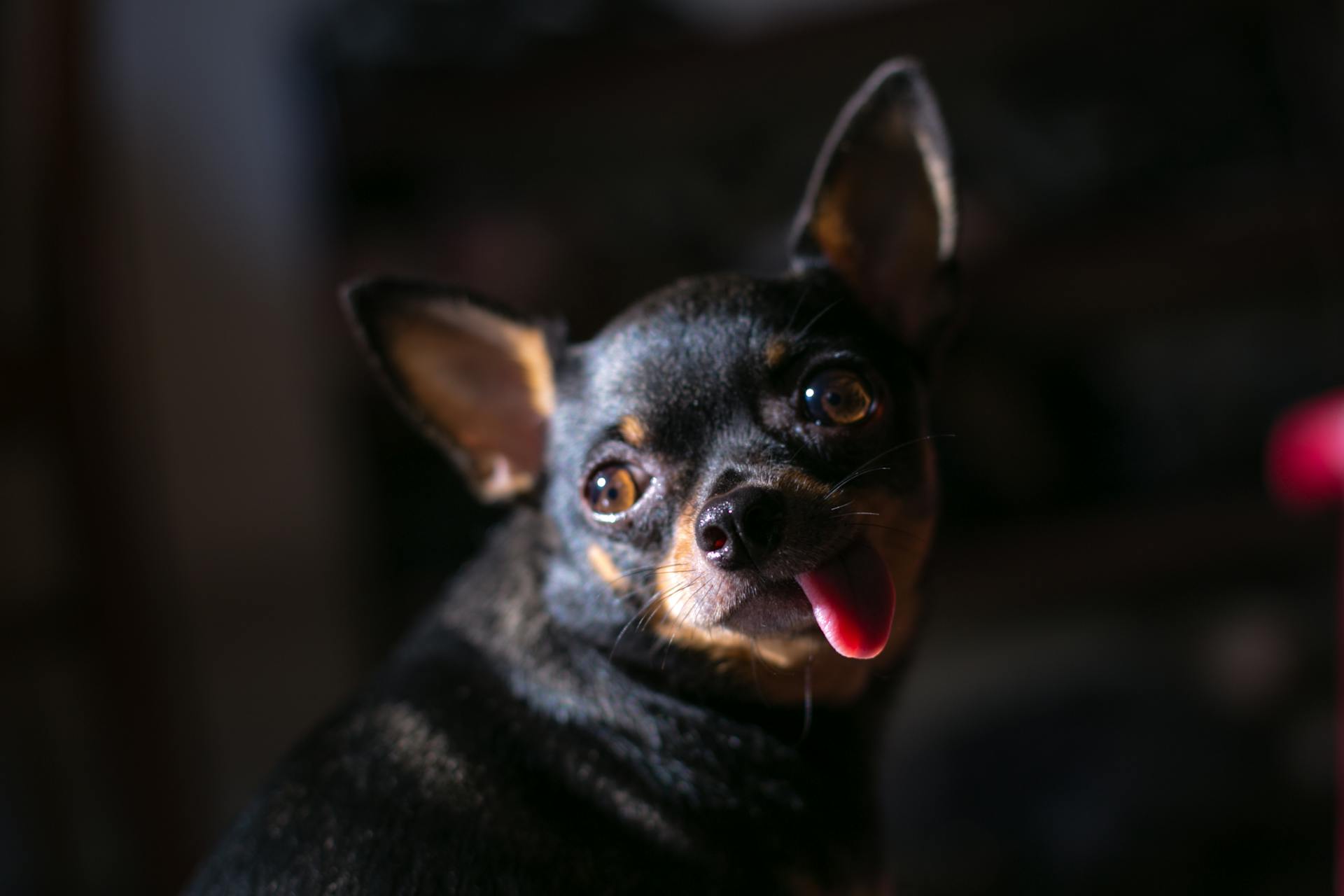
Short-haired Chihuahuas are a popular breed, known for their small size and big personality. They typically weigh between 2-8 pounds and stand 6-10 inches tall at the shoulder.
One of the best things about short-haired Chihuahuas is their low maintenance coat. They require minimal grooming, making them a great choice for busy owners.
Short-haired Chihuahuas are also highly adaptable, thriving in a variety of living situations, from apartments to homes with yards. They are happy as long as they have a loving owner by their side.
Their small size also means they don't require a lot of exercise, but they do need regular walks and playtime to stay happy and healthy.
What You Need to Know
Short-haired Chihuahuas are intelligent and fast learners, making them a joy to train with positive reinforcement like praise and food rewards.
Their small size can be a concern, especially in homes with young children under the age of eight, as they can be accidentally injured by rambunctious kids.
Chihuahuas are curious and bold explorers, often escaping from yards through small gaps in the fence.
To keep them safe, it's essential to socialize your Short-haired Chihuahua to children, adults, and other animals from an early age.
They can be mistrustful of strangers, which makes them good watchdogs, but they need to learn to meet people in a friendly manner.
Short-haired Chihuahuas are not recommended for homes with young children due to the risk of injury, but with proper training and supervision, they can thrive in a variety of living situations.
Their big personalities make them wonderful go-everywhere companions, and once you share your life with one, you may find it hard to imagine living with any other breed.
Temperament and Personality
Short-haired Chihuahuas are known for their lively personalities, being very affectionate and loving to be around people.
Their bold and confident nature makes them excellent watchdogs, with an alert nature and suspicion of strangers. They thrive on affection and companionship, often bonding strongly with a single person.
Chihuahuas can be a little reserved at first, but proper socialization as puppies helps ensure they grow into well-rounded dogs. Early exposure to many different people, sights, sounds, and experiences is crucial for their development.
Their small stature doesn't reflect their enormous personalities, which can be a mix of helpless, devoted, protective, anxious, confident, playful, and mischievous traits. This unique blend makes them full of energy and spunk.
Despite their small size, short-haired Chihuahuas are super confident, great at keeping an eye on things, and letting you know if something's up. They're like having a mini security guard around, always ready to alert you to potential issues.
Their "bitey behavior" is a characteristic often associated with Chihuahuas, likely due to their small stature. This trait, combined with their almost constant quivering, can be due to various reasons, such as being cold, low blood sugar, or anatomy issues.
Appearance and Grooming
Short-haired Chihuahuas have shiny fur that's easy to take care of.
Their smooth coats require occasional brushing to remove loose hair and maintain a glossy appearance.
Chihuahuas are small and have a round head, making them easy to spot.
Their fur is short and smooth, so they don't usually get tangled or messy.
A quick brush every now and then helps keep their coat looking nice.
They have minimal grooming requirements compared to their long-haired counterparts.
Their sleek coats require less maintenance, making them an excellent choice for busy pet owners or those with allergies.
Short-haired Chihuahuas shed small amounts year-round and may shed more heavily in the spring and fall.
Regular brushing will help keep shedding under control, and they shouldn't need a bath more than every month or two.
Their nails grow quickly, so it's essential to keep them trimmed short to avoid clicking on the floor.
Getting your Chihuahua used to nail trimming from an early age will make the experience less stressful for both of you.
See what others are reading: Do Long Haired Chihuahuas Shed
Care and Maintenance
Short-haired Chihuahuas need a brush over once a week to keep their coat looking nice. Regular grooming is essential to prevent matting and tangling.
Chihuahuas are naturally cautious of strangers, but once they're satisfied there's no threat, they'll respond happily. Socializing your Chihuahua as soon as possible is crucial to avoid any yappiness.
A daily walk is ideal for enrichment, but they're just as happy running around indoors and engaging in backyard play. This is perfect for apartment living, where they're an excellent candidate due to their limited exercise needs and size.
Here's a quick rundown of their exercise needs:
Remember to trim your Chihuahua's nails every 2-4 weeks or as needed to prevent overgrowth and discomfort. This is essential for their overall health and well-being.
Caring for Any Type
Caring for Any Type of Chihuahua is relatively easy, but it does require some attention to their specific needs. Chihuahuas are people dogs and thrive on interaction, so make sure to spend quality time with them.
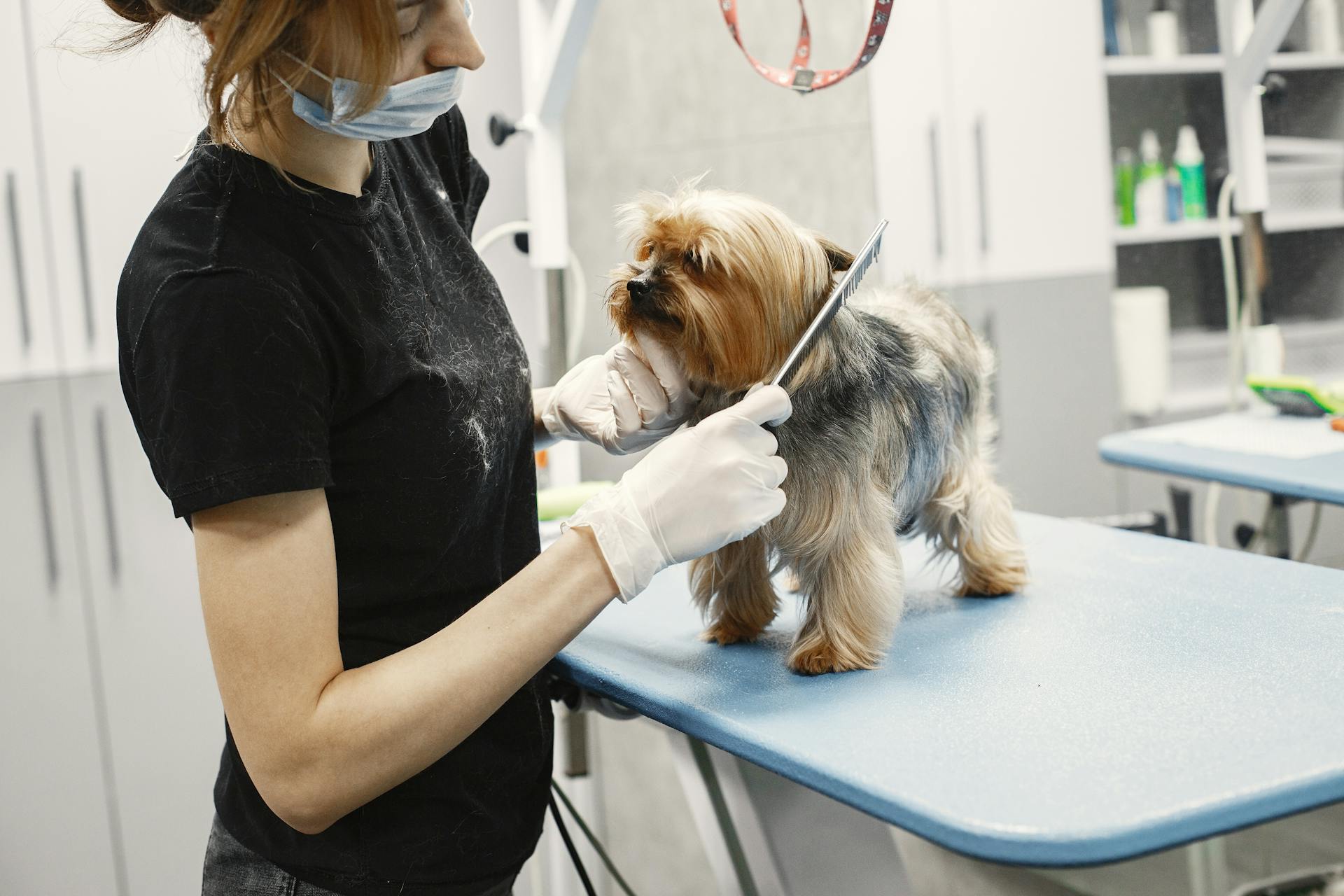
Their exercise needs are modest, but they still require regular walks and playtime. A short daily walk is ideal, but they're happy to play indoors too, especially on rainy days. Chihuahuas are also notorious for despising bad weather, so they'll likely prefer to stay inside.
Their food bill is manageable, but they do have some health issues to be aware of. A daily walk for enrichment is a great way to keep them happy and healthy, but be sure to monitor them when they're outdoors to prevent danger from birds of prey or other animals.
Chihuahuas are intelligent dogs and respond well to positive reinforcement techniques, such as praise and treats. They can be trained to use a crate, but it's essential to use a small crate to prevent accidents.
Here are some tips for caring for a Chihuahua:
- Feed them a crunchy kibble to help clean their teeth between brushings.
- Monitor them when they're outdoors to prevent danger from birds of prey or other animals.
- Use a crate to confine them when you're unable to supervise them.
- Train them using positive reinforcement techniques, such as praise and treats.
Remember, Chihuahuas are fragile and should never be left unattended around children, as accidents can happen. They're also prone to excessive barking, so early training is essential to curb this behavior. With the right care and attention, your Chihuahua will thrive and become a loving companion.
Nail Trimming
Regular nail trimming is essential to prevent overgrowth and discomfort.
Trim your short hair Chihuahua’s nails every 2-4 weeks or as needed to keep them at a comfortable length.
This will help keep your Chihuahua from experiencing discomfort or pain due to long nails.
A quick nail trim every few weeks can make a big difference in your Chihuahua's overall comfort and health.
Health and Well-being
Short-haired Chihuahuas are generally a hardy breed, but they can be prone to certain health issues. Due to their small size, they are more susceptible to injury than larger breeds.
Patella luxation is a common condition in small breeds, where the kneecap slides out of place, causing the leg to lock. This can be a hereditary issue, and it's essential to have your Chihuahua tested for this condition.
Chihuahuas are also at risk of hypoglycaemia, a condition where their liver can't store glycogen properly, leading to fluctuating blood sugar levels. This is more common in puppies and very small Chihuahuas.
Recommended read: Do Chihuahuas Have Health Problems
Their lifespan is impressive, with an average of 12-14 years, thanks to their size and internal organs scaling down relative to their body. This means their hearts don't have to work as hard, but they can still suffer from heart disease.
Dental disease is another common issue, often caused by overcrowding or poor diet. Regular cleaning and proper nutrition can help prevent this.
Here are some common health issues to watch out for:
- Dental disease: caused by overcrowding or poor diet
- Reverse sneezing: triggered by the soft palate brushing against the back of the throat
- Obesity: can lead to strain on other health conditions, such as syringomyelia and heart disease
- Syringomyelia: a condition affecting the flow and drainage of cerebrospinal fluid
- Heart disease: can progress to congestive heart failure, but early detection and intervention are critical
- Eye problems: caused by their eye sockets being too small for their eyes
It's essential to monitor your Chihuahua's growth and development, ensuring they receive proper nutrition, exercise, and veterinary care during the first year of life.
Health
Chihuahuas are generally a hardy breed, but they can be prone to certain health issues due to their small size. They're more at risk of injury than larger breeds, so it's essential to take extra care.
One condition that can affect Chihuahuas is patella luxation, where the kneecap slides out of place, causing the leg to lock. This is a common issue in small breeds and can vary in severity.
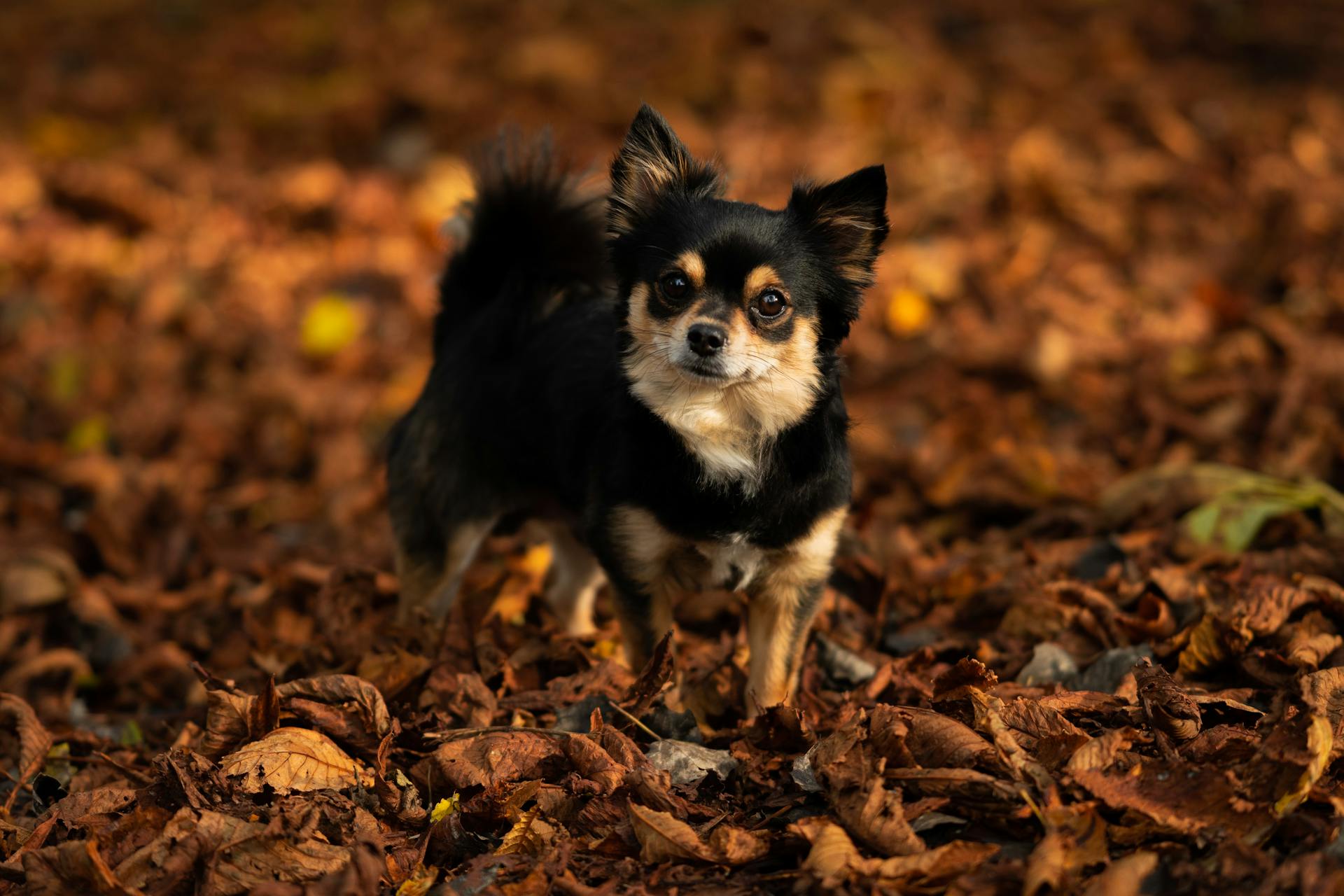
Hypoglycaemia, or low blood sugar levels, can also be a concern, especially in Chihuahua puppies and very small Chihuahuas. Their liver may not be able to store glycogen properly, leading to fluctuations in blood sugar levels.
Chihuahuas are also born with a soft spot on the top of their skull, called a molera, which can take several months to close. It's crucial to be gentle with this area to avoid any bumps or injuries.
The average Chihuahua lifespan is 12-14 years, making them one of the longest-lived breeds. This is largely due to their size, which means their hearts don't have to work as hard to circulate blood.
However, Chihuahuas can be prone to certain health issues, such as dental disease, which can be caused by overcrowding or poor dental care. It's essential to provide them with the right foods, treats, and toys to keep their teeth clean and healthy.
Reverse sneezing is another issue that can affect Chihuahuas, particularly those with delicate features or shorter noses. This is usually a minor problem, but in severe cases, surgery may be needed to trim the soft palate.
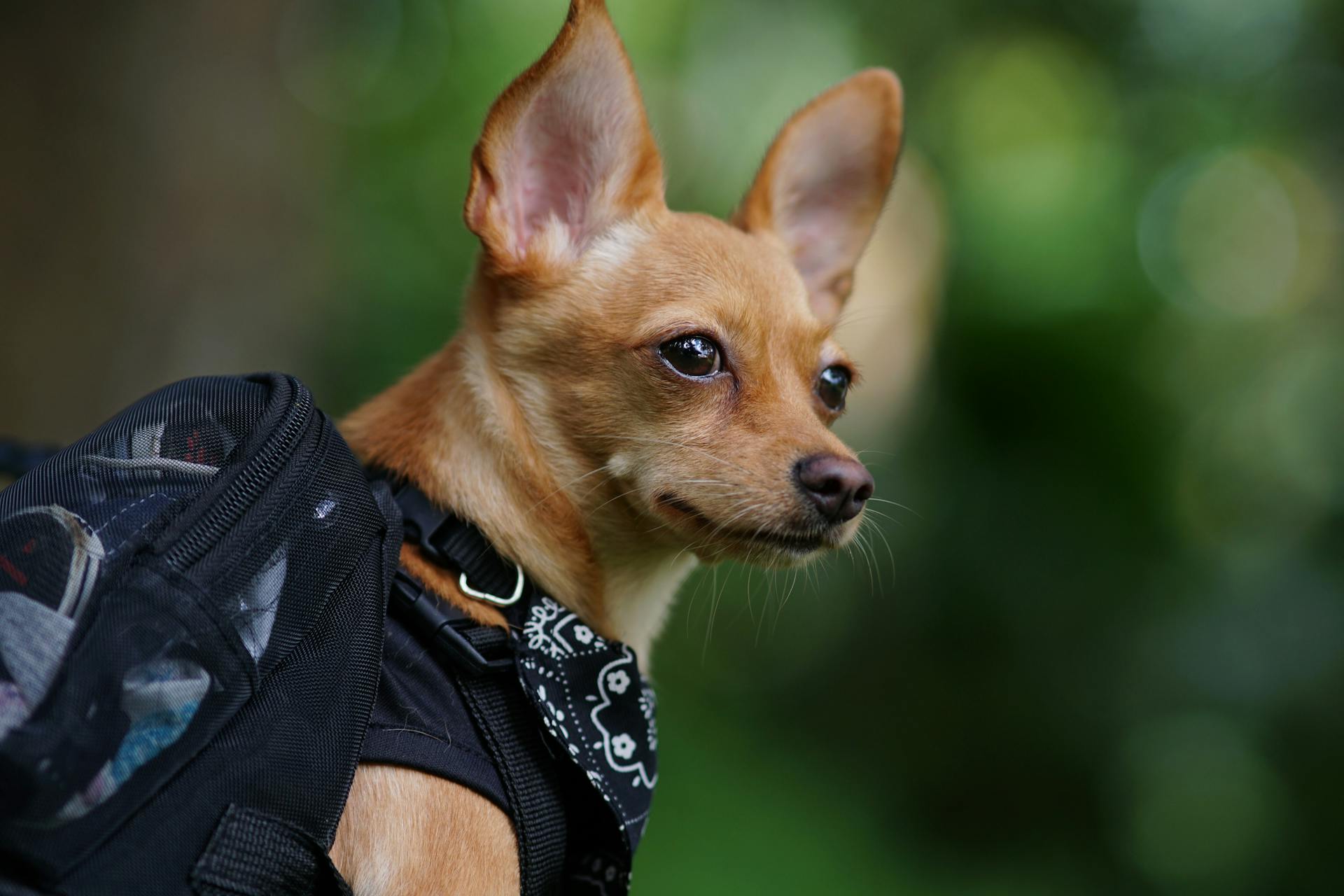
Obesity is a significant concern for Chihuahuas, as they can easily become overweight due to overfeeding. Excess weight can put extra strain on other health conditions, such as syringomyelia and heart disease.
Here are some common health issues that can affect Chihuahuas:
- Dental disease
- Reverse sneezing
- Obesity
- Syringomyelia
- Heart disease
- Eye problems
It's crucial to be aware of these potential health issues and take steps to prevent or manage them. Regular veterinary check-ups and a healthy lifestyle can go a long way in ensuring your Chihuahua leads a happy and healthy life.
A unique perspective: Are Chihuahuas Healthy
Growth and Development
As a pet owner, you want your Chihuahua to grow into a happy and healthy adult. Chihuahuas with short hair typically reach their full size within the first year of life.
Proper nutrition is key during this growth phase. A well-balanced diet will provide your Chihuahua with the necessary nutrients to support their rapid growth.
Exercise is also essential for your Chihuahua's overall development. Regular walks and playtime will help keep them active and engaged.
Veterinary care is crucial during this growth phase to ensure your Chihuahua receives regular check-ups and stays healthy.
They Love Warmth
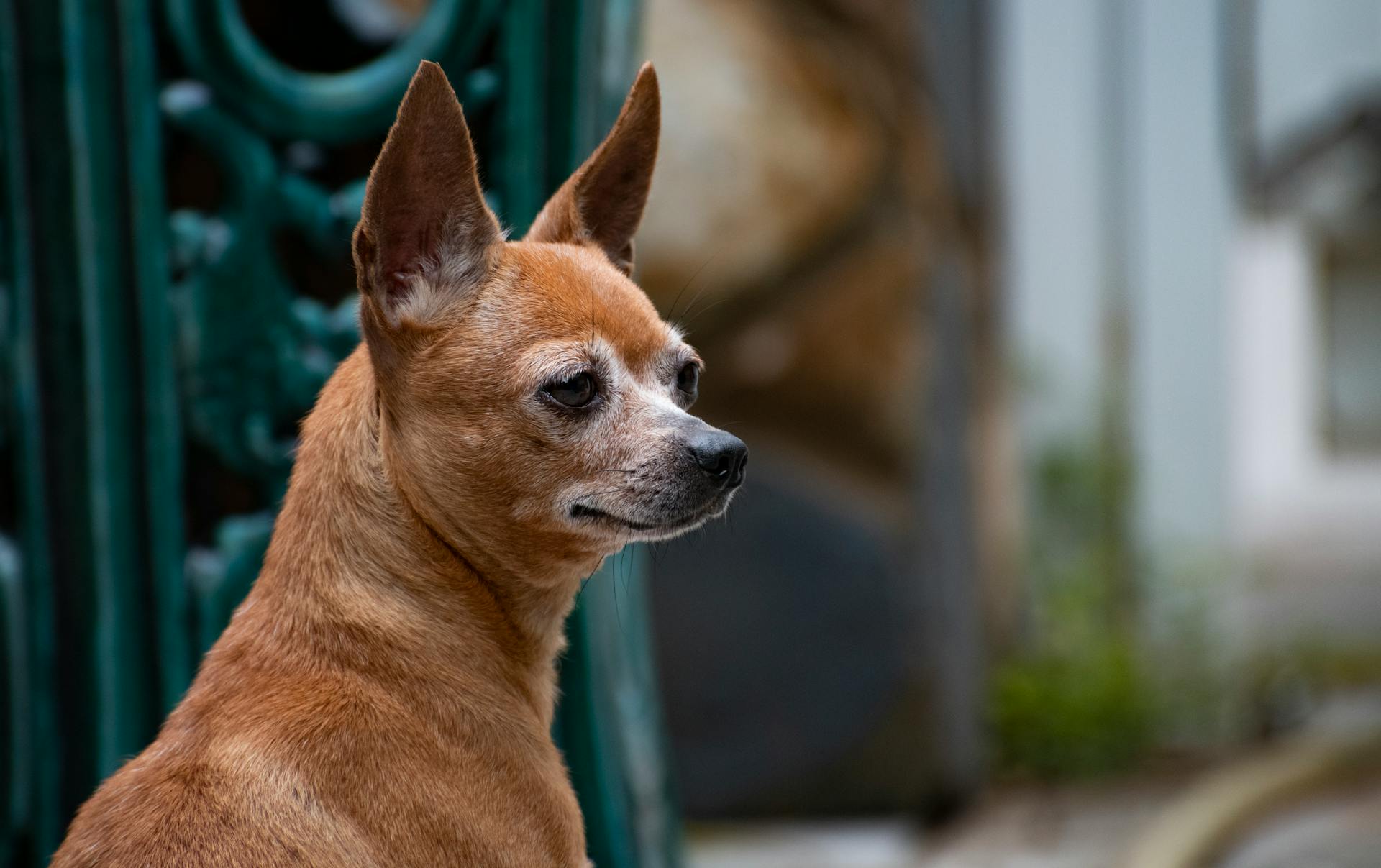
Chihuahuas are like heat-seeking devices, always on the lookout for the warmest spot in the house.
They'll burrow under blankets and dig into beds to find the perfect temperature. In fact, they love to dig into beds so much that they might even sneak into yours at night.
A hot water bottle or a warming bed can be a great way to provide extra warmth for your Chihuahua. I've seen them snuggle up behind my knees in bed, where it's nice and toasty.
If you can provide a spot in the sun, your Chihuahua will be even happier. They'll soak up the warmth and enjoy every minute of it.
Their love of warmth is one of the reasons they're often found in laundry piles or linen cupboards - it's a cozy and warm spot for them to curl up in.
Zoomies!
You know, Chihuahuas are notorious for their bursts of energy, and it's adorable to watch! They Get the Zoomies!
Most Chihuahuas love to play and will start doing laps around your home at a mile a minute until their little legs can’t go any further. This is a normal part of their behavior, and it's essential to provide them with plenty of opportunities to exercise and release pent-up energy.
Lifestyle and Compatibility
Short-haired Chihuahuas are indoor breeds who love their creature comforts. They're perfect for city living, but they do need regular walks to stay happy and healthy.
Their small size means they can be taken anywhere, but they're not "handbag dogs" and should be carried securely. They'll enjoy tearing around the garden, but be careful not to overexert them.
Chihuahuas are social animals who thrive in the company of their owners. They bond closely with one family member, but they're also happy to be part of a larger pack.
However, they're not ideal for families with small children, as they can be injured easily by rough handling. They're also not suited to boisterous households, where they might get hurt by larger pets.
Explore further: What Not to Feed Chihuahuas
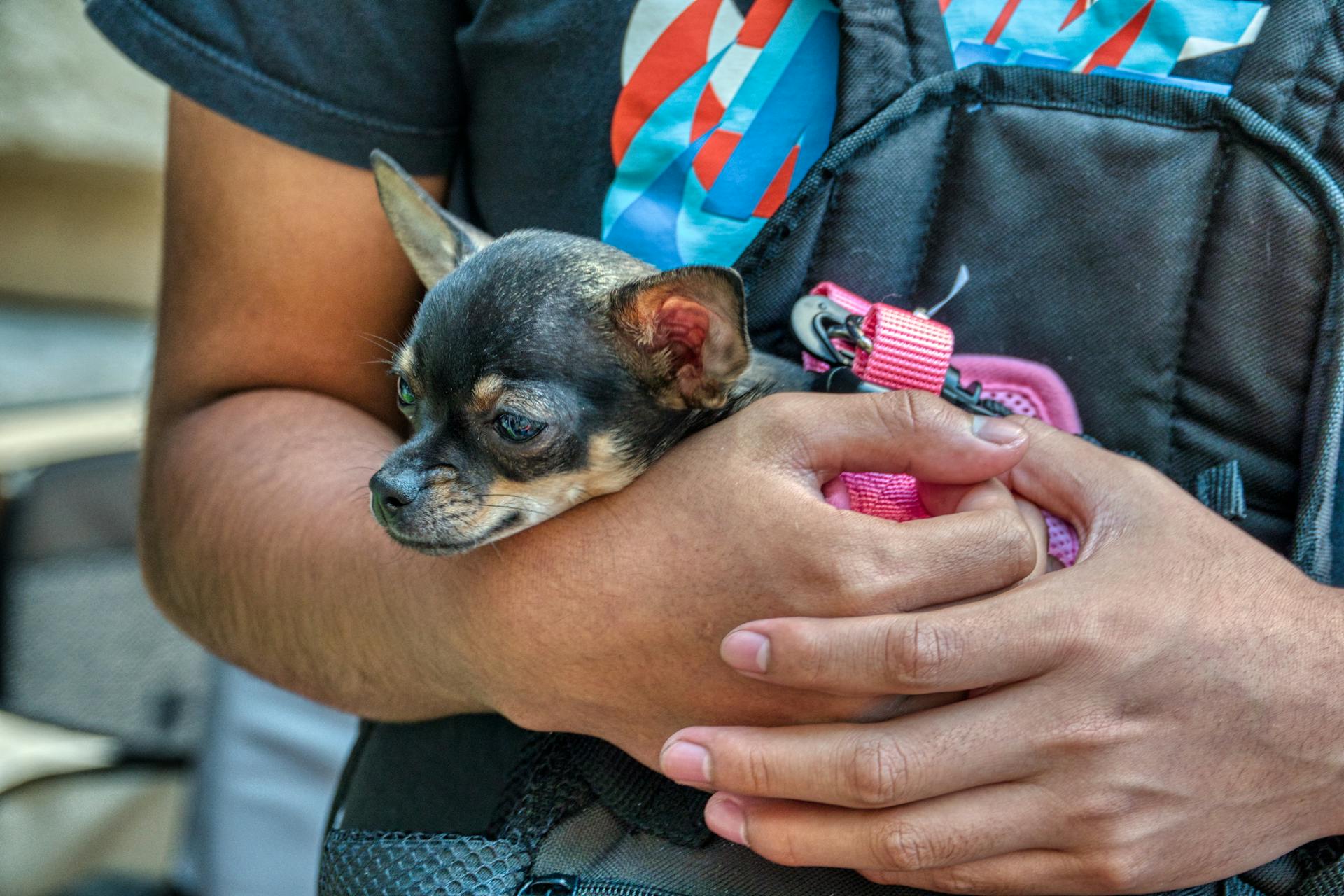
If you're thinking of getting a Chihuahua, here are some things to consider:
- They're happy to live with other dogs if socialized early.
- They can be vocal, but they make excellent watchdogs.
- They're not best suited to living with bigger breeds.
- They thrive in their owner's company and can become stressed if left alone for too long.
Here's a rough guide to helping your Chihuahua get along with other pets:
Owning a Pet
Chihuahuas like to be part of a pack and feel more secure when surrounded by other canines.
They can take over the leadership of a group of dogs due to their assertive nature and survival mechanism.
Introducing a Chihuahua to new dogs requires care to avoid accidental injuries, but it's also essential to allow them to meet each other properly and establish boundaries.
A Chihuahua can tolerate cats that are used to the company of dogs, but it's recommended to trim your cat's claws as a precaution to keep those bulging Chihuahua eyes safe.
Chihuahuas enjoy a game of chase, and cats that run away can become targets of relentless pursuit.
You might enjoy: Do Chihuahuas Get along with Cats
History and Origin
The history of the short-haired Chihuahua is a fascinating one, and it's a great conversation starter for any dog lover. The origins of this breed are unclear, but there are two main theories.
One theory suggests that the Chihuahua descended from a Central or South American dog known as the Techichi, which was depicted in Toltec carvings dating back to the 9th century C.E. These dogs were used in Aztec rituals and were believed to have mystic powers.
The Techichi was a popular breed in ancient Mexico, and its popularity continued even after the Spanish conquest. In fact, the Techichi was used as a source of food and pelts by the Aztecs, and its numbers dwindled significantly.
The modern Chihuahua was discovered in the 1850s in the Mexican state of Chihuahua, from which it took its name. American visitors to Mexico brought the little dogs back home with them and began showing them in the late 19th century.
The first Chihuahua to be registered with the American Kennel Club was a shorthaired Chihuahua named Midget, who was registered in 1904. This marked the beginning of the breed's popularity in the United States.
A different take: Short Haired American Eskimo
Types and Variations
The American Kennel Club recognizes two main varieties of Chihuahuas: short (or smooth) coat Chihuahuas and long coat Chihuahuas.
These two varieties can come in a range of colors, including Black, Blue, Cream, Fawn, and Red. You may also see them referred to as having specific markings, such as Black Mask with White Markings or Blue Mask.
Here are some of the recognized colors for short-haired Chihuahuas:
- Black
- Blue
- Cream
- Fawn
- Red
7 Types of
The American Kennel Club recognizes two main varieties of Chihuahuas: short (or smooth) coat Chihuahuas and long coat Chihuahuas.
These two varieties are the only ones officially recognized by the AKC, which is a notable distinction given the many variations you'll see in the breed.
Here are some of the most common types of Chihuahuas, though it's worth noting that not all of them are officially recognized:
In terms of color, Chihuahuas come in a variety of markings, including black mask with white markings, blue mask, cream markings, fawn markings, and red markings.
Type #7: The Fawn
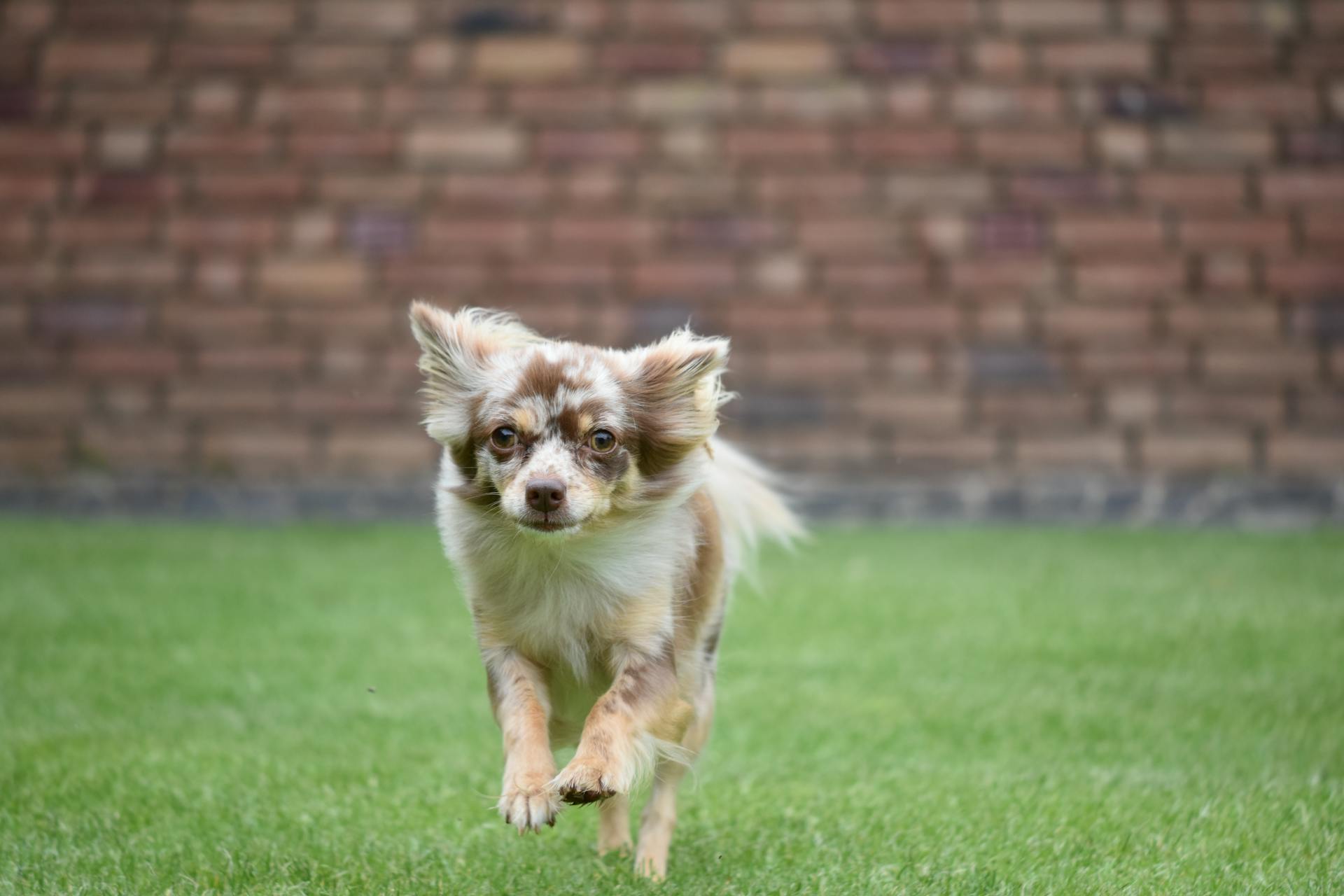
The Fawn Chihuahua is a beautiful and unique variation of the breed. They are basically brown to reddish brown in color.
Fawn Chihuahuas can have markings of different colors, which adds to their charm. You may see them with black, white, or other colors mixed in.
The AKC recognizes fawn as one of the official Chihuahua coat colors. This means that fawn Chihuahuas are just as much a part of the breed as any other color.
Here are the different fawn color variations recognized by the AKC:
- Fawn
- Fawn & White
- Blue Fawn
- Chocolate Brindled Fawn
- Chocolate Sabled Fawn
- Blue Brindled Fawn
Interesting Facts
The short-haired Chihuahua is the smallest breed of dog in the world.
One of the most distinctive features of Chihuahuas is their tendency to snort or reverse sneeze when they're overexcited, alarmed, or drink too fast. I've seen this happen to my friend's Chihuahua, and it's quite a sight!
A Chihuahua's origins are shrouded in mystery, with some claiming it's an ancient Mexican breed and others believing it came from China.
Facts
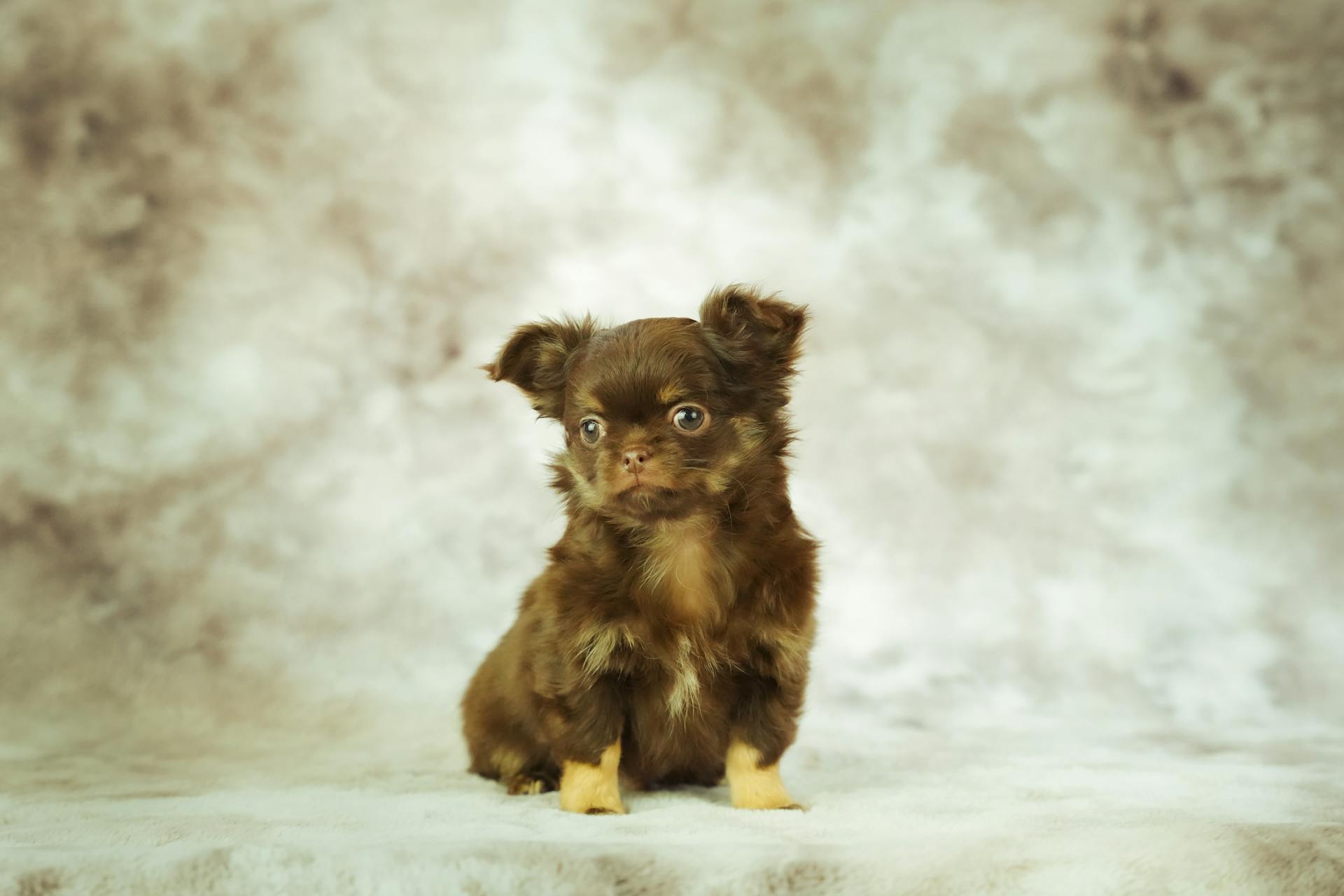
The Chihuahua is the smallest breed of dog in the world.
Some Chihuahuas are known to snort when they're overexcited, alarmed, or drink too fast.
The origins of the Chihuahua are shrouded in mystery. Some claim it is an ancient Mexican breed, while others believe the Chihuahua came from China.
I've seen Chihuahuas wear some pretty fancy collars, but none as fancy as the diamond collar worn by the first Chihuahua to dine in the House of Commons.
Here are some key facts about the Chihuahua breed:
- The Chihuahua is the smallest breed of dog in the world.
- They are known to snort (or reverse sneeze) when they're overexcited, alarmed, or drink too fast.
- The Chihuahua's origins are shrouded in mystery; some claim it is an ancient Mexican breed, while others believe the Chihuahua came from China.
- The first dog to dine in the House of Commons was a Chihuahua - he wore a diamond collar for the occasion.
Three Little-Known Facts
Did you know that the shortest war in history was between Britain and Zanzibar on August 27, 1896, and lasted only 38 minutes? This is a remarkable fact that shows how quickly conflicts can escalate and resolve.
The longest word in the English language, according to the Oxford English Dictionary, is pneumonoultramicroscopicsilicovolcanoconiosis, a lung disease caused by inhaling very fine particles of silica. This word has 45 letters and is a mouthful to say.
The human nose can detect over 1 trillion different scents, which is an incredible number considering we can smell so many different things in our daily lives.
For more insights, see: English Springer Spaniel Short Hair
Frequently Asked Questions
How much is a short hair Chihuahua?
A short hair Chihuahua from a reputable breeder typically costs between $800 to $2,500, depending on factors like the parents' quality and the puppy's health.
Featured Images: pexels.com

